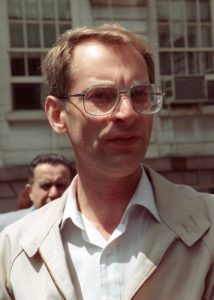 On December 22, 1984, Bernhard Goetz was riding a New York City Subway when he was confronted by four teenagers who asked him for money. Rather than being robbed and “beaten to a pulp,” Goetz pulled out a gun he was carrying and shot the boys. All four were seriously wounded.
On December 22, 1984, Bernhard Goetz was riding a New York City Subway when he was confronted by four teenagers who asked him for money. Rather than being robbed and “beaten to a pulp,” Goetz pulled out a gun he was carrying and shot the boys. All four were seriously wounded.
After the shooting, Goetz jumped out of the train on to the tracks, ran south through a subway tunnel, and went home to gather some belongings. He then rented a car and drove north to Bennington, Vermont, where he burned his blue jacket and dismantled the revolver, scattering the pieces in the woods north of town. He drove around New England for several days, registering at motels under various names and paying in cash.
Nine days later, Goetz returned to New York and turned himself in to the police. During a two-hour interview Goetz was charged with attempted murder, assault, reckless endangerment, and several firearms offenses. At the trial which followed, Goetz’s confession was used by the prosecution in the case against him.
In his confession, Goetz comes across as confused, angry, defensive, and distraught. He justifies his actions by describing an incident in which he was mugged in the past; he was injured, and the assailant went unpunished. His diatribe against the legal system and the City of New York City is eloquent and passionate, and won him many supporters in court. Goetz calls the justice system a “joke, a sham, and a disgrace.” He says he has no desire to be seen as a hero or a vigilante, but at the same time, he’s unapologetic about his actions, telling police that, “my intention was to murder them, to hurt them, to make them suffer as much as possible… If I had more bullets, I would have shot ’em all again and again. My problem was I ran out of bullets.” Goetz’s defense team described the electronics engineer as a nebbishy weakling who turned on the bullies, refusing to have sand kicked in his face. The strategy worked. The jury found Goetz not guilty of all charges except for one count of carrying an unlicensed firearm, for which he served eight months of a one-year sentence.

